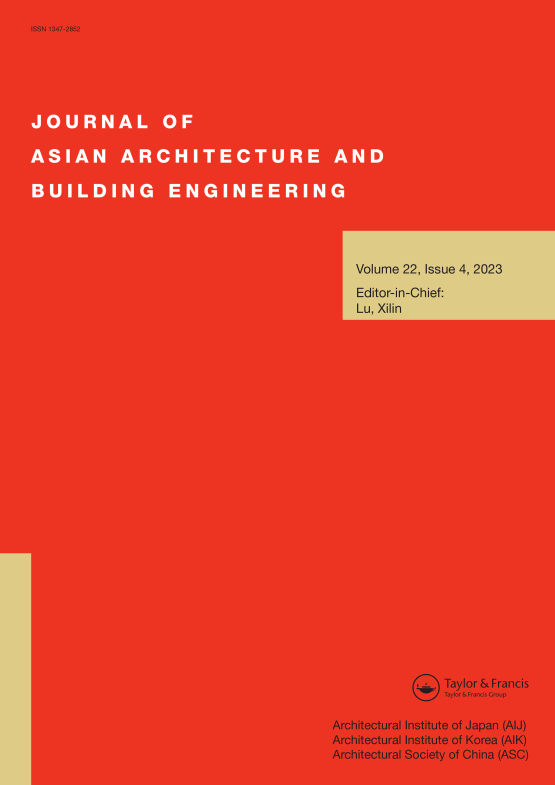Submit a Manuscript to the Journal
Journal of Asian Architecture and Building Engineering
For an Article Collection on
Environmental Technologies and Climate Emergency Practices in the Built Environment
Manuscript deadline
31 August 2024


Article collection guest advisor(s)
Karam Al-Obaidi ,
Department of the Natural and Built Environment, College of Social Sciences and Arts, Sheffield Hallam University, Sheffield, UK
[email protected]
Amirhosein Ghaffarianhoseini,
School of Future Environments, Auckland University of Technology, Auckland, New Zealand
[email protected]
Shady Attia,
Sustainable Building Design Lab, Dept. UEE, Applied Sciences, Liege University, Belgium
[email protected]
Baojie He,
School of Architecture and Urban Planning, Chongqing University, Chongqing, China
[email protected]
Eshrar Latif,
Welsh School of Architecture, Cardiff University, Wales, UK
[email protected]
Environmental Technologies and Climate Emergency Practices in the Built Environment
Climate change, environmental issues, energy consumption and carbon emissions are all challenges for the building and construction industry that require addressing now and in the future. A transition towards clean energy is a global demand to cut emissions and to act on the climate emergency. Buildings and cities have a critical role in this transition and worldwide there is a shift towards carbon neutrality to limit global warming. International Energy Agency indicated that the buildings sector needs rapid changes to get on track to achieve global net-zero emissions by 2050. Considering the period between now and 2050, there are challenges with both new and existing buildings to balance emissions from embodied sources and the operation stage.
Furthermore, controlling emissions and achieving decarbonisation means the buildings sector should focus on refurbishing existing building stock. Studies showed that certain nations such as Europe have up to 80% of existing buildings that will be in use by 2050, yet more than 90% of buildings are currently not energy-efficient to be aligned with future emission reduction targets. This issue is greatly extended in other regions such as Asia and Africa. Therefore, quick and smart options should be initiated and proposed to achieve net zero emissions by 2050.
This article collection welcomes innovative and original contributions to climate emergency practices and techniques to identify problems and/or to provide solutions for the built environment. The collection targets topics on sustainable technologies to mitigate environmental issues in buildings and cities. This special issue aims to showcase innovative and adaptive solutions to achieve decarbonisation and the development of climate emergency in the fields of architectural technology and building engineering. Possible contributions include but are not limited to:
- Technical models and frameworks for decarbonising buildings and cities
- Sustainable retrofit strategies, frameworks and actions for climate emergency
- Innovative strategies and technologies for global and local climate change mitigation
- Life cycle assessment and carbon neutrality in design and construction
- Environmental assessment methods and building/urban performance simulation/modelling
- Digital twin and IoT in the built environment
- Climate emergency practices for smart cities and buildings
- Environmental technologies for building and city information modelling
- AI, big data and data analytics as climate emergency practices in the built environment
Manuscripts published in the special collection can be original research, reviews, technical papers, and case studies.
Keywords: Environmental Technologies; Climate Emergency Practices; Smart Buildings and Cities; Modelling and Simulation; Decarbonisation and Sustainable Retrofitting
All manuscripts submitted to this Article Collection will undergo a full peer-review; the Guest Advisor for this collection will not be handling the manuscripts (unless they are an Editorial Board member). Please review the journal scope and author submission instructions prior to submitting a manuscript.
The deadline for submitting manuscripts is August 31, 2024.
Please contact Zhan Yu at [email protected] with any queries and discount codes regarding this Article Collection.
Please be sure to select "Environmental Technologies and Climate Emergency Practices in the Built Environment" from the drop-down menu in the submission system.
Benefits of publishing open access within Taylor & Francis
Global marketing and publicity, ensuring your research reaches the people you want it to.
Article Collections bring together the latest research on hot topics from influential researchers across the globe.
Rigorous peer review for every open access article.
Rapid online publication allowing you to share your work quickly.
Looking to Publish your Research?
Find out how to publish your research open access with Taylor & Francis Group.
Choose open accessSubmission Instructions
All manuscripts submitted to this Article Collection will undergo desk assessment and peer-review as part of our standard editorial process. Guest Advisors for this collection will not be involved in peer-reviewing manuscripts unless they are an existing member of the Editorial Board. Please review the journal Aims and Scope and author submission instructions prior to submitting a manuscript.